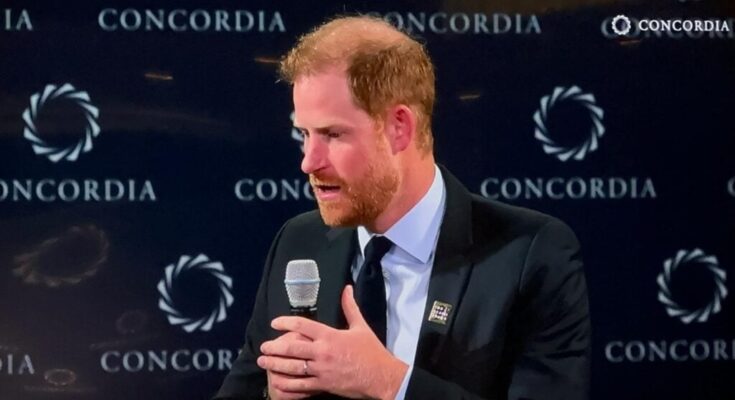
The Concordia Summit 2024 began with a bang on Monday morning, when diplomats, business professionals, and non-for-profit representatives from all over the world descended upon the Sheraton Times Square hotel to facilitate private-public partnerships and network.
Co-founders Matthew Swift and Nicholas Logothetis opened the summit applauding the conference’s 14th iteration and its strength through representation and diversity. The summit included many A-List attendants, including the Prince of Wales and the President of the Dominican Republic, Luis Abinader, as well as the Secretary General of NATO, Jens Stoltenberg.

“Our approach [of] ensuring that all voices are heard at the table when approaching the world’s most challenges has proven to be a success over the years,” said Logothetis, co-founder and chairman of Concordia’s board at the beginning of the conference.
Logothetis declared that Concordia is the most inclusive gathering outside of the United Nations, the General Assembly of which was occurring just under two miles away on the West Side. Geopolitical and economic turbulence necessitates the need for conferences like Concordia, which, according to Logothetis, is “needed more, now than ever.”

Dynamic discussions and high-profile speakers at Concordia 2024
Throughout the day, attendees heard from a wide range of speakers tackling global issues from diplomatic relations to economic sustainability. Highlights from Monday’s agenda included but were not limited to:
- Prince Harry, Duke of Sussex, who joined the conversation in the afternoon, taking part in a dialogue on the mental health crisis among global youth, alongside Dr. Tessy Ojo, CEO of The Diana Award, Chiara Riyanti Hutapea Zhang, and youth advocate Christina Williams. The Prince of Wales drew the most fanatic crowd, with a surplus of attendees attending his appearance and causing pedestrian congestion inside the Sheraton.
- Another key session, “A Bipartisan Approach to Foreign Policy,” saw contributions from U.S. Representatives Mike Waltz, a Republican, and Chrissy Houlahan, a Democrat, which offered a nuanced discussion on forging common ground in international relations.
The two differed on various positions but maintained a healthy dialogue; topics discussed included the Russia-Ukraine war, the conflict in Gaza, Chinese competition with America in the tech sector and security strategy in Latin America. - Environmental and economic sustainability also took center stage, with Uber CEO Dara Khosrowshahi and former U.S. Environmental Protection Agency (EPA) administrator Gina McCarthy leading the conversation on “Livable Cities: The Cross-Sector Role in Building a Low-Emissions Future.” The panel mostly consisted of discussions surrounding climate change ideologies, which McCarthy notably labeled a “people problem.” Much of the conversation revolved around ride-sharing services’ effect on reducing gas emissions from personal vehicles.
- Toward the end of the conference, New York Governor Kathy Hochul spoke in “Learning and Growing, Not Clicking and Scrolling: How Governor Hochul is Combatting the Use of Smartphones in Schools,” about a recently passed New York State law that would ban the use of phones in public schools, which she defended as necessary from a maternal and educational perspective.“[Kids] are held captive to these algorithms that are designed to bombard them with information they won’t like, because it’s taking personal information about them and turning around and pulling them deeper and deeper,” said Governor Hochul. “This calls for government intervention, and I’m willing to take on the fight.”
Foreign and defense policy in context
In the afternoon and evening of Concordia 2024, many of the topics discussed revolved around foreign policy and cooperation. “Leadership Through Crisis,” a panel conducted by Shaila Manyam, a former diplomat and public affairs expert, dove into the minds of significant private and public leaders. These include the commanding general of the US Army Forces Command, Andrew Poppas, who is of Greek American descent, Karthik Ramanna, a professor of business and public policy at the University of Oxford’s Blavatnik School of Government, and Arun Gupta, CEO of the Noblereach Foundation, a talent search-based non-profit organization for academic, private, and public industry professionals.
General Poppas often stressed that the echelon hierarchy of the military made it imperative that he and his fellow servicemen build their teamwork through “shared experiences” and that these secure team relationships can “decentralize [the] execution of solutions through subordinate leaders,” meaning that effective team-building requires less overhead from a top authority.
NATO Secretary General Jens Stoltenberg reiterated the organization’s support for its strategy in the Eastern Bloc and the sovereignty of Ukraine. Stoltenberg stressed the ever-changing global security environment and European nations’ increases in defense spending.
“Most importantly, back in 2014, when we were together at the Wales Summit, we made the decision to increase defense spending—2 percent spending on defense,” said Stoltenberg.
“At that time, three allies spent more than 2 percent on defense: Greece, the United States and the United Kingdom,” Stoltenberg continued. “Today, in 2024, 23 allies spend more than 2 percent on defense.”



